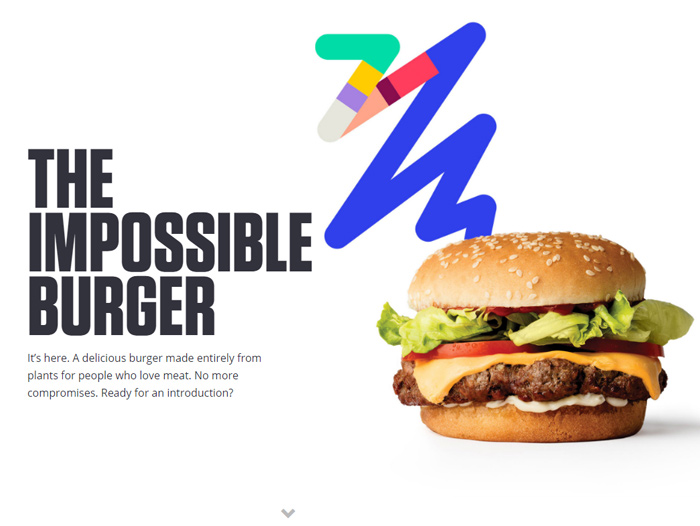Impossible Foods Boosts Sustainability Across All Key Metrics
March 22, 2019 | 6 min to read

REDWOOD CITY, Calif.– Impossible Foods publishes a comprehensive life cycle assessment on Impossible Burger 2.0, the food tech startup’s award-winning, plant-based meat.
When consumers buy an Impossible Burger instead of a burger from cows, they reduce their impact across every significant environmental category, including land-use, use of freshwater, greenhouse gas emissions, and aquatic pollution from runoff.
According to the objective, third party-validated report from Quantis, Impossible Burger 2.0 — the first product upgrade from Impossible Foods since the 2016 debut of the Impossible Burger — is more sustainable than Impossible’s original product. More important, the award-winning 2.0 is vastly better for the planet than ground beef from cows.
Compared to beef from cows, Impossible Burger 2.0:
- Requires 87% less water.
- Releases 89% less greenhouse gases into the atmosphere.
- Contributes 92% less water contamination, the major cause of “dead zones” in our oceans.
- Spares 96% more land and habitat for nature and biodiversity.
“We are dead serious about our mission of providing vastly more sustainable options than livestock in the food chain,” said Impossible Foods’ CEO, Chairman and Founder Dr. Patrick O. Brown. “To do that, we have to make meat that’s delicious, nutritious, versatile and affordable—and it must also be vastly more efficient and sustainable than anything else on the market. We constantly measure and optimize every aspect of our product — particularly taste and sustainability.”
Delicious, Nutritious, Ubiquitous
Earlier this year, Impossible Foods launched its first product upgrade at the International Consumer Electronics Show (CES), where “Impossible Burger 2.0” took home the show’s highest honors, including “Best of the Best,” “Most Impactful Product,” and “Most Unexpected Product.” Impossible Burger’s first product upgrade since its 2016 public debut was also hailed as the tech show’s “Best Product Launch” and a “Triumph of Food Engineering.”
Impossible Burger is now served at thousands of restaurants across the United States, Hong Kong, Macau and Singapore. Later this year, the plant-based Impossible Burger is expected to debut in grocery stores in the United States.
Impossible Foods uses modern science and technology to create wholesome and nutritious food that can transform the food system, liberating land to allow natural ecosystems to flourish while nourishing a growing population. The company makes meat from plants – with a much smaller environmental footprint than meat from animals.
To satisfy the global demand for meat at a fraction of the environmental impact, Impossible Foods developed a far more sustainable, scalable, and affordable way to make meat, without the huge environmental impact of livestock.
Shortly after its founding in 2011, Impossible Foods’ scientists discovered that one molecule — “heme” — is uniquely responsible for the explosion of flavors that results when meat is cooked. Impossible Foods’ scientists genetically engineerand ferment yeast to produce a heme protein naturally found in plants, called soy leghemoglobin.
The heme in Impossible Burger is identical to the essential heme humans have been consuming for hundreds of thousands of years in meat — and while the Impossible Burger delivers all the craveable depth of beef, it uses far fewer resources because it’s made from plants, not animals.
Experts say: Meat from plants is better for the planet
According to a study published in the Journal Science, eating less animal meat is the single most effective way one can help reduce his or her impact on earth. Every person who swaps out one pound of ground beef for one pound of Impossible’s plant-based meat can personally save seven pounds of greenhouse gas emissions, 290 square-feet of land and 90 gallons of water.
Impossible Foods’ life cycle assessment (LCA) considers the respective impacts of the Impossible Burger versus beef produced in the industrial livestock system across four major environmental categories: water consumption; land occupation; global warming caused by animal greenhouse gas emissions and deforestation; and water pollution from runoff of nutrients and fertilizer.
Quantis, the Lausanne, Switzerland-based consulting firm validated the data and built the LCA model, meeting the requirements for LCA studies set by International Organization of Standardardization (ISO), a process considered the gold standard in environmental assessments.
For more information, please read the Executive Summary of Impossible Foods’ LCA here.
ABOUT IMPOSSIBLE FOODS
Based in California’s Silicon Valley, Impossible Foods makes delicious, nutritious meat and dairy products directly from plants — with a much smaller environmental footprint than meat from animals. The privately held company was founded in 2011 by Patrick O. Brown, M.D., Ph.D., Professor Emeritus of Biochemistry at Stanford University and a former Howard Hughes Medical Institute investigator. Investors include Khosla Ventures, Bill Gates, Google Ventures, Horizons Ventures, UBS, Viking Global Investors, Temasek, Sailing Capital, and Open Philanthropy Project.
